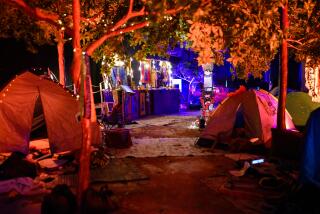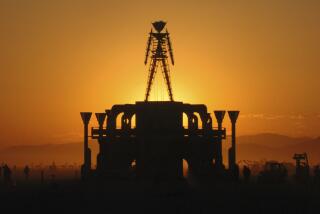Censorship Charges Over ‘Freedom Fest’
- Share via
Was last month’s much-ballyhooed Nelson Mandela birthday concert, billed in the United States as the “Freedom Fest,” a victim of censorship?
That’s the charge being leveled by rock performers and press critics alike, who have blasted the Fox Television Network and the Westwood One radio network for deleting most of the political commentary from their June 18 broadcasts of the marathon all-star concert at London’s Wembley Stadium.
The New Musical Express (NME), one of London’s top rock publications, wrote: “While most of the world watched the biggest names in pop condemn apartheid live on their TV screens, American viewers were given heavily censored coverage. The show was broadcast on a six-hour delay, which gave (Rupert Murdoch-owned Fox Television) the opportunity to take out any references to South Africa, the anti-apartheid movement--and even Mandela himself.” NME went on to quote “insiders” at the concert who said America’s sanitized screening of the event was due to pressures from U.S. advertisers.
Meanwhile, Steve Van Zandt, who performed at the show and who was a key figure behind the 1985 anti-apartheid anthem “(Ain’t Gonna Play) Sun City,” wrote a commentary for the Op-Ed Page of the New York Times in which he decried U.S. coverage as “trivializing the event.” He said the “censored” broadcasts “probably helped to lower political consciousness more than raise it.”
Van Zandt added that his comments labeling South Africa a terrorist state and urging sanctions “somehow did not get across the Atlantic. . . . I for one, would never knowingly have participated in an event that was to be purged of its politics, especially when the man being honored is known for his political courage and principles.”
It’s easy to see why a pop activist would be upset by the broadcast, which gave a somewhat distorted impression that precious few political remarks were made during the day (Calendar’s Chris Willman took note of the broadcast’s strangely “apolitical” performances in his review).
Van Zandt wrote that Fox refused to offer an explanation. Fox wasn’t much more forthcoming with us--though the network had been happy to cooperate when it was soliciting coverage before the event. However, Fox corporate exec Michael Binkow said the six-hour Fox broadcast couldn’t possibly have included every political message or performance from the 11-hour show. He added: “Our intention was to highlight as much of the music as possible. We did not censor the show in any way for sponsors or anyone else.”
Norm Pattiz, head of the Westwood One radio syndication network which aired all of the concert’s performances on nearly 70 stations around the country, acknowledged that his broadcast also trimmed lengthy political speeches. However he insisted the move was a programming decision, not a censorship issue.
“There was no censorship at all--that’s not our style,” he said. “We were not instructed by any sponsor or anyone to delete anything. In fact, we carried political comments by all the performing musicians there. The only people we cut away from were non-music personalities, be they actors or political speechmakers. But any musician who made political remarks got to speak their piece. We carried all of Little Steven’s commentary. And we did lots of live interviews with artists there, who were frequently asked about their political views.
“But we did it in programmable 60- or 90-second interviews, not in 10- or 15-minute dialogues. If we’d broadcast those 15-minute blocks of political commentary, we’d never have attracted many of the stations who carried the event. It just would’ve been bad radio. It might be appropriate for ‘The Larry King Show,’ but not for a music event that’s aimed at reaching the broadest possible market.”
Pattiz noted that Westwood One has syndicated numerous other politicized pop events, including the Live Aid broadcast and the Amnesty International concerts (which will again air on Westwood One later this year).
More to Read
The biggest entertainment stories
Get our big stories about Hollywood, film, television, music, arts, culture and more right in your inbox as soon as they publish.
You may occasionally receive promotional content from the Los Angeles Times.










